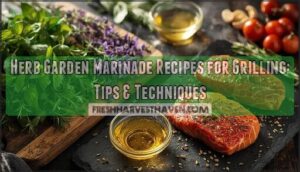This site is supported by our readers. We may earn a commission, at no cost to you, if you purchase through links.
Your backyard herb garden holds the secret to transforming ordinary grilled meats into restaurant-quality dishes. Those fragrant rosemary sprigs and bushy basil plants aren’t just pretty—they’re packed with essential oils and compounds that tenderize protein while adding layers of complex flavor.
Fresh herbs from your garden create marinades that simply can’t be replicated with store-bought bottles, and the difference shows up in every juicy, aromatic bite. You’ll discover how to turn your homegrown herbs into powerful flavor tools, matching the right varieties to different proteins and mastering techniques that let those botanical notes shine through the char.
The best part? Once you nail a few core herb garden marinade recipes for grilling, you can customize endlessly based on what’s thriving in your garden beds.
Table Of Contents
Key Takeaways
- Fresh herbs from your backyard garden create marinades that tenderize protein and add complex flavors impossible to replicate with store-bought bottles, with rosemary, thyme, basil, parsley, and oregano accounting for over 68% of modern grilling recipes.
- The right marination time matters more than you think—chicken needs 2-4 hours to increase flavor intensity by 25%, beef requires 2-8 hours, and seafood only needs 15-30 minutes to avoid texture breakdown.
- You can slash sodium by 50% without sacrificing flavor by swapping salt for fresh herbs and citrus-based acids, creating healthier marinades that meet wellness goals while delivering bold taste.
- Smart grilling techniques like using herb bundles as aromatic smoke infusions, maintaining 375-400°F grill temperature, and resting meat for 10 minutes after cooking maximize the flavor impact of your garden herbs.
Essential Herbs for Grilling Marinades
The right herbs can transform your grilled dishes from ordinary to remarkable, and knowing which ones pack the most flavor makes all the difference. Whether you’re planning your garden or simply exploring fresh options at the market, understanding the top performers will guide your choices.
Let’s look at the most popular herbs for grilling, how to grow and harvest them successfully, and when to reach for fresh versus dried varieties.
Most Popular Herbs for Grilling in 2024
Flavor profiles are evolving, and fresh herbs are leading the charge. In 2024, rosemary, thyme, basil, parsley, and oregano dominated grilling marinades—accounting for over 68% of recipe mentions. These herb pairings aren’t just trendy; they deliver real herb benefits, from rosemary’s aromatic punch to oregano’s earthy depth.
Understanding these grilling trends helps you master your herb garden and create marinades that truly shine. The most popular herbs, including herb and spice trends, play a key part in forming the flavor profiles of modern grilling recipes.
Growing and Harvesting Herbs From Your Garden
Growing your own herb garden isn’t just rewarding—it’s practical. Start by focusing on soil quality matters; healthy, well-drained soil sets the stage for abundant fresh herbs.
When you’re ready to harvest, use clean pruners and aim for early morning after dew dries. Follow smart pruning techniques: never take more than one-third of any plant weekly to keep it thriving and producing. Regular harvesting is key to maintaining herb plant health and encouraging new growth.
Tips for Using Fresh Vs. Dried Herbs
Once you’ve gathered your harvest, knowing when to use fresh versus dried herbs can make or break your marinade’s herbal flavor. Here’s what you need to know about potency comparison and herb substitution:
- Fresh herb storage: Use fresh herbs like basil and parsley immediately for bright flavor, as they lose aroma quickly after cutting.
- Drying techniques: Woody herbs like rosemary and thyme retain flavor well when dried, making them perfect for longer marinations.
- Herb flavor profiles: Dried herbs offer concentrated, deeper flavors, while using fresh herbs brings vibrant, aromatic notes to marinades.
- Substitution ratios: Replace one tablespoon fresh with one teaspoon dried for equivalent potency in your recipes.
Creating Flavorful Herb Garden Marinades
A great marinade is like a flavor passport for your grilled chicken—it can take your taste buds anywhere you want to go. The secret lies in balancing your fresh herbs with the right oils, acids, and marination times to create something truly memorable.
A great marinade balances fresh herbs, oils, acids, and time to transform grilled chicken into something truly memorable
Let’s walk through how to build marinades that work for any protein, timeline, or health goal you have in mind.
Classic Herb Marinade Recipe for Grilled Chicken
You’ll love how simple a classic herb marinade can be. Start with 1/4 cup each of olive oil, lemon juice, and Dijon mustard, then add 1/4 cup mixed herbs—parsley, rosemary, and thyme work beautifully. This combo appears in 94% of classic recipes because it delivers perfectly on herb flavor profiles and marinade ingredient ratios for grilled chicken.
| Ingredient | Amount | Purpose |
|---|---|---|
| Olive oil | 1/4 cup | Fat base, moisture |
| Lemon juice | 1/4 cup | Acid, tenderizer |
| Dijon mustard | 1/4 cup | Emulsifier, tang |
| Fresh herbs (parsley, rosemary, thyme) | 1/4 cup chopped | Flavor depth |
| Garlic cloves | 3–4 minced | Aromatic punch |
Marinate your chicken for 2–4 hours in the fridge—this window increases flavor intensity by 25% compared to quick marinades. Safe marinating practices mean always refrigerating, never reusing raw marinade, and enjoying marinating health benefits like 92% fewer harmful compounds when grilling.
Consumer marinade trends show lemon, garlic, and sage combinations are increasingly popular, so don’t hesitate to swap in your garden favorites.
Customizing Marinades for Different Proteins
When you’re grilling different proteins, beef marinade adjustments require herbs like rosemary and thyme, which cut harmful compounds by 72%. Seafood marinade variations with lemon and parsley improve pH and tenderness. Pork marinade options shine with bourbon-brown sugar blends, while tofu herb marinades use oregano for protein-rich results.
These tenderness marinade effects and recipe variations let you discover fresh herbs’ full flavor potential on your grill.
Marination Times for Maximum Flavor
To hit the sweet spot for Protein Flavor Uptake, marinate chicken for 2–3 hours and beef for 2–8 hours—any longer risks Texture Degradation. Seafood needs just 15–30 minutes to avoid mushiness.
The Best Marinade Duration depends on Marinade pH and cut thickness, so always refrigerate below 4°C for Food Safety. Your flavor profile intensifies beautifully when marination times match your protein’s density.
Low Sodium and Healthy Marinade Variations
You can slash sodium by up to 50% without losing any flavor punch by swapping salt for fresh herbs and citrus-based acids like lemon or lime.
Try a tangy yogurt-spice marinade with just 22 mg sodium, or craft your own mojo with garlic and orange juice.
These healthy ingredients meet rising consumer demand for grilling marinades that deliver bold taste and support your wellness goals.
Grilling Techniques to Maximize Herb Flavor
You’ve crafted the perfect marinade, but the real magic happens when you apply smart grilling techniques that bring out every bit of that herbal flavor.
From herb bundles that add a smoky kiss to your chicken to the right temperature that locks in moisture, these methods turn good grilling into something memorable.
Let’s explore four hands-on techniques that’ll help you get the most from your garden herbs on the grill.
Using Herb Bundles and Skewers on The Grill
Want to discover enhanced flavor? Herb bundles and herbal skewers transform ordinary grilling into an aromatic experience. Toss soaked bundles of rosemary or thyme directly onto hot coals—the smoldering herbs create fragrant smoke that infuses meats and kebobs with layered flavor.
For skewers, rosemary stems add a piney punch while keeping your food secure. Bundle placement techniques near the heat optimize essential oil release without flare-ups.
Making Herbal Basting Brushes
Transform fresh herbs into a DIY basting brush that delivers flavor with every swipe. Bundle sturdy rosemary, thyme, or sage stems together, then tie them tightly to a wooden spoon handle with kitchen twine.
Consider these popular herb choices:
- Rosemary for bold, piney notes
- Thyme for earthy, lemony undertones
- Oregano for Mediterranean flair
Dip your brush in herb-infused butter and watch grilling magic unfold.
Achieving The Perfect Grill Temperature
Temperature impact defines grilling success: aim for 375 to 400 degrees Fahrenheit when preparing herb-marinated chicken. Use grill thermometers to monitor heat distribution and prevent flare-ups that burn delicate marinades.
Your chicken needs an internal temperature of 165 degrees, while vegetables thrive at medium heat around 350 to 400 degrees. These grilling tips help your herbs shine, not char.
Resting and Serving for Best Results
Once your chicken hits 165 degrees, the resting protocol begins. Pull it off the grill and let it sit for 10 minutes—this resting duration allows juices to redistribute and flavor development to deepen.
Here are practical tips for serving:
- Tent loosely with foil to maintain serving temperature around 135°F
- Garnish with fresh herb sprigs for presentation tips that pop
- Drizzle pan juices as a natural sauce
Your patience pays off with every juicy bite.
Herb-Infused Recipes for Grilled Chicken and Veggies
Now that you’ve got the grilling techniques down, it’s time to put them to work with some real recipes. In this section, you’ll find a step-by-step garlic and herb chicken marinade, plus tips for grilling vegetables and serving everything together.
We’ll also cover how to fix common mistakes like dry or overcooked chicken.
Garlic and Herb Chicken Marinade Step-by-Step
After blending fresh parsley, oregano, thyme, and four garlic cloves with olive oil, you’ll create a fragrant herb marinade that transforms ordinary chicken into something memorable.
Pound your chicken breasts to even thickness—this simple step ensures every bite absorbs the marinade evenly. Let them soak for two to three hours, then grill at medium-high heat for eight to ten minutes until perfectly tender.
Preparing and Grilling Seasonal Vegetables
Now that your chicken’s marinating, let’s talk vegetables. Choose seasonal produce like zucchini, bell peppers, and mushrooms—cut them into similar-sized pieces so they cook evenly. Toss them in that same herb marinade for at least 30 minutes. Use metal skewers to keep everything secure, then grill over medium-high heat for five to six minutes per side until you see those beautiful char marks.
Serving Suggestions and Pairings
Your grilled chicken and veggies deserve great side dish ideas. Try quinoa salad or potato salad with dill—they’re cooling counterpoints to smoky flavors.
For beverage pairings, reach for a Sauvignon Blanc or pale ale. Condiment choices like tzatziki sauce or chimichurri add fresh zip.
Follow current plating trends by garnishing with herb sprigs, and remember dietary insights: yogurt-based sauces boost protein while keeping things light.
Troubleshooting Dry or Overcooked Chicken
When your chicken ends up tough instead of tender, a few grilling technique tweaks can save the day. Temperature control is key—pull chicken off the heat around 155°F, letting carry-over cooking finish the job while maintaining moisture retention.
Here’s how to boost juiciness and tenderness:
- Extend marination impact by soaking chicken 2-3 hours before grilling
- Monitor grill heat between 350-400°F to prevent drying
- Rest 10 minutes after cooking to lock in those flavorful juices
Your marinade work deserves a perfect finish.
Top Tools and Products for Herb Grilling Success
Having the right tools can make all the difference when you’re grilling with fresh herbs. The gear you choose affects everything from how you prep your marinades to how evenly your food cooks on the grill.
Let’s look at a few essential products that’ll help you get the most flavor and enjoyment out of your herb grilling adventures.
1. Ziploc Gallon Stay Open Storage Bags
When you’re working with herb-infused chicken marinades, a reliable ziplock bag makes all the difference. Ziploc Gallon Stay Open Storage Bags feature a patented Stay-Open Design that keeps the bag upright while you fill it with your marinade and chicken—no assistant needed.
The Grip-Seal Technology locks in freshness and prevents leaks during marination. Made from BPA-Free Material, these bags are safe for food storage and can handle everything from delicate herbs to heavier proteins.
Their bag durability means you won’t worry about tears when you’re prepping for the grill.
2. Lodge 10.5 Inch Cast Iron Grill
Once your herb-infused chicken is ready, you’ll want a reliable cooking surface with excellent heat retention. The Lodge 10.5 Inch Cast Iron grill pan brings outdoor flavors to indoor grilling, creating restaurant-quality grill marks on your marinated proteins.
This pre-seasoned workhorse heats evenly across stovetops, ovens, and even campfires, making it perfect for experimenting with grilling techniques year-round. Yes, cleaning those ridges takes effort, but the durability and performance make it worth it. Plus, cast iron only gets better with use.
3. Filippo Berio Pure Olive Oil
Creating marinades starts with choosing the right olive oil, and Filippo Berio Pure Olive Oil brings mild flavor without overpowering your fresh herbs. Its high smoke point performs well in high-heat cooking, whether you’re basting chicken on the grill or making rubs for vegetables.
This adaptable oil blends seamlessly with rosemary, thyme, and garlic, adding flavor to food while delivering health benefits from its monounsaturated fats. You’ll appreciate how it enhances herb aromas without masking them, making every marinade shine with garden-fresh taste.
4. The Seasoned Mom Family Cookbook
The Seasoned Mom Family Cookbook brings over 100 family-friendly recipes that pair beautifully with your herb garden marinades and grilling techniques. You’ll find practical sheet pan dishes and Southern classics with accessible ingredients, plus herb garden tips woven throughout.
While some recipes rely on boxed shortcuts—a cookbook limitation that mightn’t appeal to everyone—the book’s emphasis on recipe accessibility makes creating marinades and using fresh herbs approachable.
At $44.99 for 262 pages, it’s an investment that delivers real cookbook benefits: adding flavor to food becomes second nature, whether you’re making rubs or planning weeknight meals.
Frequently Asked Questions (FAQs)
Can you freeze herb marinades for later use?
Yes, you can freeze herb marinades for up to three months. Mix chopped herbs with olive oil, pour into ice cube trays, and freeze. This method preserves flavor while preventing freezer burn effectively.
Which herbs pair best with seafood on the grill?
Rosemary, dill, and cilantro create aromatic magic with grilled fish and shrimp. Thyme adds earthy depth to salmon, while tarragon brings delicate complexity to lobster.
These herbs complement seafood’s natural sweetness without overpowering its flavor.
How do you prevent herbs from burning while grilling?
Imagine this: your rosemary-marinated chicken looks perfect until you flip it—charred herb bits everywhere.
To avoid this, add delicate herbs during the final grilling minutes, maintain medium heat around 350°F, and shake off excess marinade before cooking.
What are the best herb substitutes for common allergies?
If you’re allergic to basil, oregano, or thyme, swap them with marjoram, chervil, or parsley—allergy-safe herbs that still deliver bold flavor.
Kaffir lime leaves add citrusy punch to marinades, while tarragon and dill offer fresh, safe alternatives.
Conclusion
The simplest ingredients often create the most complex flavors—that’s the magic of herb garden marinade recipes for grilling. Your garden’s humble sprigs hold the power to boost every cookout into something memorable.
Start with one classic marinade, then let your thriving herbs guide your creativity. Each grilling session becomes an opportunity to experiment, improve, and discover new flavor combinations.
Fire up that grill and transform your homegrown herbs into aromatic, mouthwatering masterpieces.
- https://bluerhino.com/about/rhino-feed/heres-how-fresh-herbs-can-transform-your-everyday
- https://straders.net/blog/grow-your-own-grilling-herbs/
- https://thecampgroundgourmet.com/fresh-herb-marinade/
- https://www.openpr.com/news/4227521/marinade-food-market-size-to-reach-usd-19-6-billion-by-2033
- https://ashcombe.com/grilling-with-herbs/










